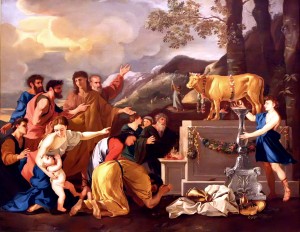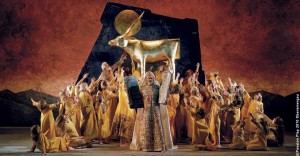Those who make them will become like them, everyone who trusts in them. (Psalm 115:8)
 Last week we talked about the nature of idols. This week we look at the nature of their makers. And this is a very scary verse: Those who make them will become like them, everyone who trusts in them. In other words— dead. If you want to live, then you must believe in the living God. But if you don’t care about eternal life, then any idol serve its purpose, to lead you to death.
Last week we talked about the nature of idols. This week we look at the nature of their makers. And this is a very scary verse: Those who make them will become like them, everyone who trusts in them. In other words— dead. If you want to live, then you must believe in the living God. But if you don’t care about eternal life, then any idol serve its purpose, to lead you to death.
We must ask the question, who is doing the making? Is it the one true living God, or is man getting it wrong again? The One Who lives, creates life. The one who is dead, can only manifest death. Actually, cannot manifest anything. The manifestations are left up to those who make them and worship them.
When being compared to idols we are way too similar. How do you feel about that? Go through that list of characteristics that describe them, and now apply them to you.
- They cannot speak
- They cannot see
- They cannot hear
- They cannot smell
- They cannot feel
- They cannot walk
- They cannot make a sound with their throat
But you say, “That doesn’t apply to me! Why by my very objection, you can see that I can talk, and if I am of a more expressive variety, here I am waving my hands.” And physically, that is all very true. But spiritually, you are more like the idol then you understand.
Once you were dead because of your disobedience and your many sins. (Ephesians 2:1)
It is a sad thing that we have become both the deceived and the deceivers; that we would choose death over life, and encourage others to join us.
But that is our nature. Consider what it is that God gives to us, and that which an idol never can. The thief comes only to steal and kill and destroy, I came that they may have life, and have it abundantly. (John 10:10) That’s what Jesus said, life abundant.
So that Christ may dwell in your hearts through faith; and that you, being rooted and grounded in love, may be able to comprehend with all the saints what is the breadth and length, and height and depth, and to know the love of Christ which surpasses knowledge, then you may be filled up to all the fullness of God. (Ephesians 3:17-19)
I have been crucified with Christ; and it is no longer I who live, but Christ lives in me; and the life which I now live in the flesh I live by faith in the son of God, who loved me and gave Himself up for me. (Galatians 2:20)
For the one who sows to his own flesh will from the flesh reap corruption, but the one who sows to the Spirit will from the Spirit reap eternal life. (Galatians 6:8)
I charge you in the presence of God, who gives life to all things… (1 Tim 6:13)
He saved us, not on the basis of deeds which we have done in righteousness, but according to His mercy, by the washing of the regeneration and renewing by the Holy Spirit, whom He poured out upon us richly through Jesus Christ our Savior, so that being justified by His grace we would be made heirs according to the hope of eternal life. (Titus 3:5-7)
This is the promise which He Himself made to us: eternal life. (1 John 2:25)
It is obvious to see by all of the preceding verses, that life is a result of loving, serving, and being in the presence of the Lord of life. But making, worshiping, and serving idols will only result in one thing— death. Because Those who make them will become like them. Next week we’ll discuss the scope of these actions.

 When the Psalmist speaks of “Their”, he is speaking about the nations. And these nations had tangible, visible idols. These so-called gods were obviously important to them, because they were made of gold and silver; precious metals for precious gods. But as is often the case with mankind who has not been exposed to the principles and teachings of the Most High God, we get it wrong. Or in this case we get a completely backwards. Note that it says, The work of man’s hands. God is not the work of our hands; we are the work of His hands.
When the Psalmist speaks of “Their”, he is speaking about the nations. And these nations had tangible, visible idols. These so-called gods were obviously important to them, because they were made of gold and silver; precious metals for precious gods. But as is often the case with mankind who has not been exposed to the principles and teachings of the Most High God, we get it wrong. Or in this case we get a completely backwards. Note that it says, The work of man’s hands. God is not the work of our hands; we are the work of His hands. Idols are pretty much no longer silver and gold, but they still are that which are either made by man’s hands or by his imagination. Idols are things which you pursue, instead of One True God. But, we are told: Whatever you do, do your work heartily, as for the Lord rather than for men. (Colossians 3:23) To do otherwise is a dangerous pursuit. More about that next week.
Idols are pretty much no longer silver and gold, but they still are that which are either made by man’s hands or by his imagination. Idols are things which you pursue, instead of One True God. But, we are told: Whatever you do, do your work heartily, as for the Lord rather than for men. (Colossians 3:23) To do otherwise is a dangerous pursuit. More about that next week. Now comes the personal request: I sought the LORD and he answered me, He delivered me from all my fears.
Now comes the personal request: I sought the LORD and he answered me, He delivered me from all my fears. Years ago I remember Billy Graham talking about one of the ways he did devotions—5 psalms a day and one chapter of Proverbs. So at the end of each month, he would have read through both books. Whenever I am not in front of one of my computers doing my study/devotion/prayer (I am currently working on the Fruit of the Spirit) I use this 5 x 1 study to come into His Presence.
Years ago I remember Billy Graham talking about one of the ways he did devotions—5 psalms a day and one chapter of Proverbs. So at the end of each month, he would have read through both books. Whenever I am not in front of one of my computers doing my study/devotion/prayer (I am currently working on the Fruit of the Spirit) I use this 5 x 1 study to come into His Presence. How often are we blessing and extolling the LORD? At all times. In Hebrew all times means at all events, all occasions, and at all times. This word is more than a generalization, it can be absolute; and in its definition are “all for every”, and “all the everywhere”. When God says all, He means all.
How often are we blessing and extolling the LORD? At all times. In Hebrew all times means at all events, all occasions, and at all times. This word is more than a generalization, it can be absolute; and in its definition are “all for every”, and “all the everywhere”. When God says all, He means all. This is a great question, because it describes with uncanny accuracy what has been going on in our nation: the Supreme Court’s decision to legalize same sex marriage; the rush to approve and even applaud transgender procedures; and the tolerance-screamers, who show no resemblance to what the purportedly proclaim. I could go on describing our upside-down culture, but I’ve made my point. The foundations have collapsed.
This is a great question, because it describes with uncanny accuracy what has been going on in our nation: the Supreme Court’s decision to legalize same sex marriage; the rush to approve and even applaud transgender procedures; and the tolerance-screamers, who show no resemblance to what the purportedly proclaim. I could go on describing our upside-down culture, but I’ve made my point. The foundations have collapsed. I love this verse because it brings hope to an entire world.
I love this verse because it brings hope to an entire world. Do you wish you could say that? That the LORD God has come to you in the night and found in you nothing wrong? What is it about the night?
Do you wish you could say that? That the LORD God has come to you in the night and found in you nothing wrong? What is it about the night? For once you were full of darkness, but now you have light from the Lord. So live as people of light! For this light within you produces only what is good and right and true. Carefully determine what pleases the Lord. Take no part in the worthless deeds of evil and darkness; instead, expose them. (Ephesians 5:8-11)
For once you were full of darkness, but now you have light from the Lord. So live as people of light! For this light within you produces only what is good and right and true. Carefully determine what pleases the Lord. Take no part in the worthless deeds of evil and darkness; instead, expose them. (Ephesians 5:8-11) We now see the result of being lifted up—in plain sight—on a rock. It’s not a matter of sight; rather it is a matter of power. He has been exalted, set on high, over his enemies. Yes they do indeed surround David, but it is of no consequence, because He is the one with power and authority, not they. And David knows full well where that power and authority come from.
We now see the result of being lifted up—in plain sight—on a rock. It’s not a matter of sight; rather it is a matter of power. He has been exalted, set on high, over his enemies. Yes they do indeed surround David, but it is of no consequence, because He is the one with power and authority, not they. And David knows full well where that power and authority come from. The day of trouble. Sounds ominous. And the Hebrew word for trouble has darker translations: calamity, disaster, and wickedness are the three most used. Here are the other occurrences of this specific phrase.
The day of trouble. Sounds ominous. And the Hebrew word for trouble has darker translations: calamity, disaster, and wickedness are the three most used. Here are the other occurrences of this specific phrase.
 So what’s the context here? Why did God come down? We begin in verse 6:
So what’s the context here? Why did God come down? We begin in verse 6: